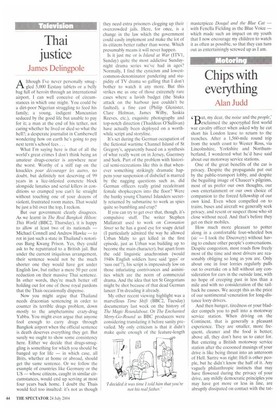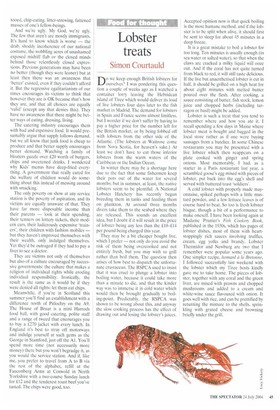Chips with everything
Alan Judd
4 ut, my dear, the noise and the people,' I) exclaimed the apocryphal first world war cavalry officer when asked why he cut short his London leave to return to the trenches. After a 1,560-mile round trip from the south coast to Wester Ross, via Lincolnshire, Yorkshire and Northumberland, I wondered what he'd have said about our motorway service stations.
One of the great benefits of the car is privacy. Despite the propaganda put out by the public-transport lobby, and despite the beguiling image of Chaucer's pilgrims, most of us prefer our own thoughts, our own entertainment or our own choice of companion to the forced fellowship of our own kind. Even when compelled on to trains, buses and aircraft we generally seek privacy, and resent or suspect those who sit close without need. And that's before they get on their mobiles.
How much more pleasant to potter along in a comfortable four-wheeled box (sic — I took the Discovery) without having to endure other people's conversations. Despite congestion, most roads flow freely most of the time and most drivers are reasonably obliging so long as you are. Only about one in four lorries regularly pulls Out to overtake on a hill without any consideration for cars in the outside lane, with no hope of creeping past in less than a mile and with no consideration of the tailback he causes. We accept this as the price of our sentimental veneration for long-distance lorry drivers.
And then hunger, tiredness or your bladder compels you to pull into a motorway service station. When driving on the Continent, that is generally a pleasant experience. They are smaller, more frequent, cleaner and the food is better; above all, they don't have us to cater for. But entering a British motorway service station after the cocooned musings of your drive is like being thrust into an anteroom of Hell. Sartre was right: Hell is other people, but he didn't know the half of it. Any vaguely philanthropic instincts that may have flowered during the privacy of your drive, any mildly democratic principles you may have got more or less in line, are abruptly dissipated on contact with the tat
tooed, chip-eating, litter-strewing, fattened masses of one's fellow-beings.
And we're ugly. My God, we're ugly. The few that aren't are mostly immigrants. It's hard to know which is worse — the drab, shoddy incoherence of our national costume, the wobbling acres of unashamed exposed midriff flab or the closed minds behind those relentlessly closed expressions. Previous generations may have been no better (though they were leaner) but at least then there was an awareness that 'better' existed, even if they couldn't afford it. But the regressive egalitarianism of our times encourages its victims to think that however they are is OK because that's how they are, and that all choices are equally 'valid' (except any that denies this). They have no awareness that there might be better ways of eating, dressing, living.
The catering industry encourages them with bad and expensive food. It would presumably argue that supply follows demand, but we all know that junk food is cheap to produce and that better supply encourages better demand. Watching a family of bloaters guzzle over £20 worth of burgers, chips and sweetened drinks. I wondered why Kids' menus have deep-fried everything. A government that really cared for the welfare of children would do something about this instead of messing around with smacking.
The only poverty on show at any service station is the poverty of aspiration, and its victims are equally unaware of that. They have far more disposable income than their parents — look at their spending, their tenners on lottery tickets, their modern cars, their ludicrously expensive 'trainers', their children with fashion mobiles — hut they haven't improved themselves with their wealth, only indulged themselves. Yet they'd be outraged if they had to pay a fiver to see a doctor.
They are victims not only of themselves but also of a culture encouraged by successive governments: the culture that makes a religion of individual rights while eroding individual responsibility. Ironically, the result is the same as it would be if they were denied all rights: let them eat chips.
Meanwhile, if you're in Scotland this summer you'll find an establishment with a difference north of Pit'ochry on the A9. The House of Bruar is a mini Harrods food hall, with good catering, polite staff and a range of tweed that encourages you to buy a £270 jacket with every lunch. In England it's best to stray off motorways and indulge yourself at such gems as the George in Stamford, just off the Al. You'll spend more time (not necessarily more money) there but you won't begrudge it, as you would the service station. And if, like me, you prefer to travel from A to B via the rest of the alphabet, refill at the Fauconberg Arms at Coxwold in North Yorkshire with a two-course Sunday lunch for £12 and the tenderest roast beef you've tasted. The chips were good, too.



























































 Previous page
Previous page